Japan's Official Development Assistance White Paper 2011
Section 2 Measures for Each Priority Issue
Poverty Reduction, Sustainable Growth, Approaches to Global Issues, and Peace-Building are addressed as the four priority issues in the ODA Charter. This section introduces Japan's recent efforts in relation to these issues.
1. Poverty Reduction
(1) Education
Education plays an important role in the socio-economic development that is needed for poverty reduction. It also enables individuals to develop their own talents and capabilities, as well as to live with dignity. Education fosters understanding towards other people and different cultures, and forms the foundation for peace. However, across the world approximately 67 million children are still out of school. Approximately 800 million adults do not have minimum literacy (the ability to read and write short, simple sentences), two-thirds of which are women. (Note 5) To improve this situation the international community is striving to achieve "Education for All (EFA)" (see "Terminology" on page 34).
<Japan's Efforts>
Emphasizing "nation-building" and "human resource development," Japan has continued to provide developing countries with a broad range of support for education, including the enhancement of basic education, higher education, and vocational training. In 2002, Japan announced the "Basic Education for Growth Initiative (BEGIN)". In accordance with BEGIN, Japan provides assistance that combines the equipment and facilities aspect, such as constructing schools, with the knowledge and expertise aspect, such as training of teachers, with priority emphasis on (i) ensuring access to education, (ii) improving quality of education, and (iii) improving of formulation of education policies and educational administration system.
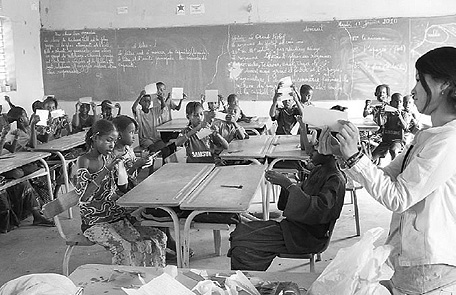
A Japan Overseas Cooperation Volunteer teaches Origami at an elementary school in Senegal (Photo: Kensuke Saito)
In 2010, Japan released the "Japan's Education Cooperation Policy 2011-2015," as its new educational cooperation policy to be implemented from 2011 through 2015, the deadline for achievement of Millennium Development Goals (MDGs) (see the figure on page 10 for details regarding MDGs). The new policy promises that over next five years from 2011 Japan will provide $3.5 billion, with the focus on (i) basic education, (ii) post-basic education (secondary education following the completion of primary education, vocational training and education, higher education), and (iii) education for vulnerable countries affected by conflict or disaster. Japan aims to establish quality educational environment, giving particular attention to alienated children, vulnerable countries, and other areas that is difficult to receive the assistance, and provides aid to enable individuals who have completed primary education to continue further education. Through this assistance, at least 7 million children will be able to receive the high-quality educational environment. In addition, Japan has proposed "School for All," a basic educational aid model that is designed to provide access to education for all children. As part of its new policy, working together with schools, regions, communities, and governments, Japan is engaged to improve the learning environment in the variety of aspects such as (i) quality education (improving the quality of teachers), (ii) school based management, (iii) inclusive education for children disadvantaged attending school due to poverty, gender, disability, and others, and (iv) safe learning environment (provision of school facilities, health and sanitation).
At the breakout session for education at the MDGs Follow-up Meeting held in Tokyo in June 2011, the theme of improving quality of education was discussed and established a comprehensive document of examples of effective approaches.
In addition, regarding the "Fast Track Initiative (FTI)" (see "Terminology" on page 34), a global assistance framework aiming at achieving universal primary education by 2015, Japan has served as a G8 co-chair and member of the Steering Committee since January 2008, and has been proactively involved in FTI discussions and reform efforts. Further, Japan’s contributions to FTI-related funds from FY2007 to FY2010 totaled approximately $5.5 million.
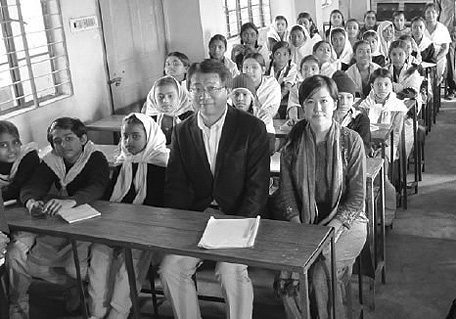
Parliamentary Vice-Minister for Foreign Affairs Ikuo Yamahana visits an elementary school in Bangladesh, where a Japan Overseas Cooperation Volunteer provides environmental education
In April 2008, Japan delivered a message at the International Symposium on Self-Reliance and Sustainability of EFA, which stressed the need for further improvement in basic education in both quality and quantity, enhancement of support for diverse educational stages beyond basic education, partnership between education and other fields, and participatory efforts that involve all people concerned both domestic and abroad. Specific initiatives to Africa that have been announced and steadily implemented a five-year plan from 2008 to achieve the commitment to construct 1,000 primary and secondary schools (containing roughly 5,500 classrooms) benefiting approximately 400,000 children, to provide capacity development for 100,000 mathematics and science teachers (about 300,000 teachers worldwide), and to improve school management for 10,000 schools in Africa.
Afghanistan is a country with an estimated illiterate population of approximately 11 million (about 40% of the population) due to the impact of three decades of civil war. The government of Afghanistan has established a goal of providing 3.6 million people with literacy education by 2014. Since 2008, Japan is contributing to the promotion of literacy education in Afghanistan with a total of approximately ¥3.3 billion in grant aid through the United Nations Educational, Scientific and Cultural Organization (UNESCO) to provide literacy education to 600,000 people in 100 districts of 18 provinces of Afghanistan.
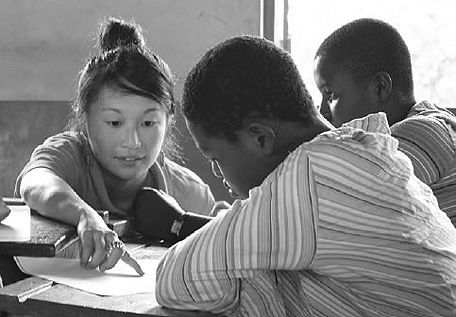
A Japan Overseas Cooperation Volunteer serving at an elementary school in Ghana (Photo: Shoko Mori)
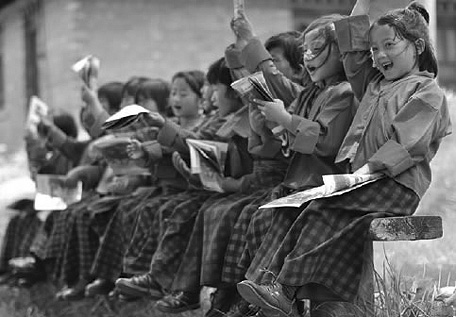
Because classrooms in Bhutan are small and dark, sometimes class is held outside under blue skies (Photo: Kensaku Seki/JICA)
In recent years, Japan has promoted transnational networking of institutes of higher education and joint research projects among neighboring countries etc. Japan also supports the development of human resources in developing countries by accepting international students to Japanese institutes of higher education in accordance with the "300,000 International Students Plan." Furthermore Japan implements "International Cooperation Initiative" projects, which are designed to use the knowledge possessed by Japanese universities (their research achievements and capacity to develop high-level human resources) to improve the quality of international cooperation. Major activities under the Initiative include formulating and publicizing teaching materials and guidelines based on the experience and knowledge possessed by Japanese educational academies.
Moreover, Japan strives to make it easier for in-service teachers to go overseas as Japan Overseas Cooperation Volunteers under the Special Program for School Teachers.* In-service teachers dispatched to developing countries contribute to the development of education and society locally, and make use of that experience in the field of Japanese education after their return.
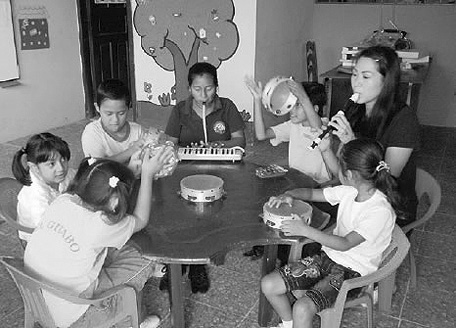
An in-service teacher serving as a Japan Overseas Cooperation Volunteer at a school for the disabled in Ecuador. The tambourines used by the children were donated by people in Japan. (Photo: Chizuru Iijima)
Terminology
*Basic education
Educational activities designed to enable individuals to acquire the knowledge, value, and skills needed to live. Mainly refers to primary education, preschool education, and adult literacy education.
*Special Program for School Teachers (JOCV)
The system is designed to encourage participation of in-service teachers. For example, teachers who are recommended by Ministry of Education, Culture, Sports, Science and Technology to JICA are exempt from the preliminary technical test, and the period of dispatch is set at two years (usually two years and three months), beginning in April and ending in March, to match the regular Japanese school year.
Notes:
(5) Source: "EFA Global Monitoring Report 2011" (UNESCO)
[South Sudan]
"Strengthening Mathematics and Science Education in Southern Sudan (SMASESS)"
Technical Cooperation Project (November 2009 - Current)
In South Sudan it is a serious issue to ensure the quality of education, due to the lack of teachers to keep up with growing number of students and poor quality of teachers, approximately 65% of whom receive no necessary training. Japan has focused its cooperation on mathematics and science education at primary and secondary schools, which is vital to the development of the country. Japan actively supports for improving the ability of mathematics and science teachers of primary and secondary schools, and the overall quality of mathematics and science education, by supporting developing human resources to train teachers, and creating a model to implement systematic training. At teachers who received training from Japan are expected to become instructors to provide similar training in each province, it is expected that between 1,000 and 1,500 teachers will be trained throughout South Sudan (see page 101 for details regarding South Sudan).
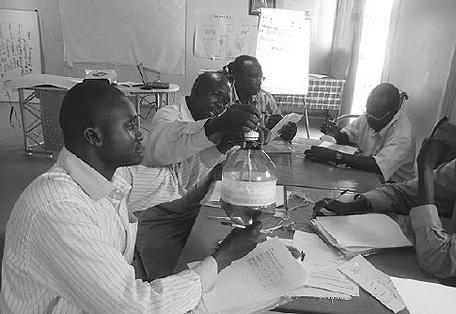
Developing human resources to support future nation-building (Photo: JICA)
